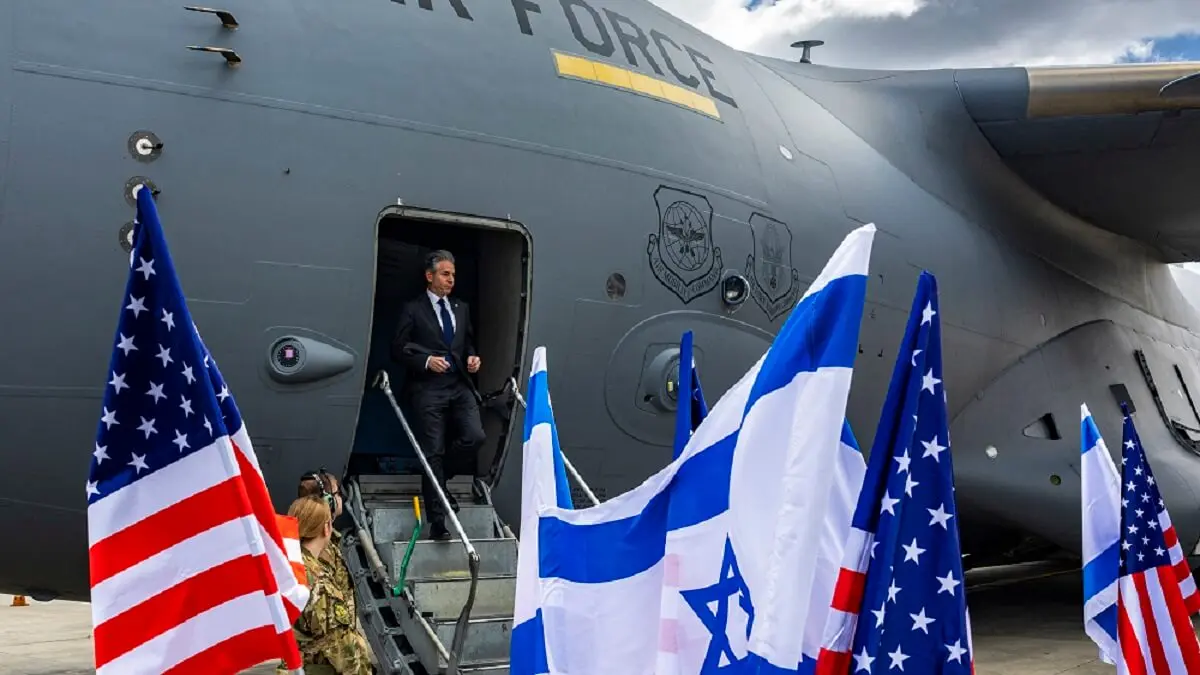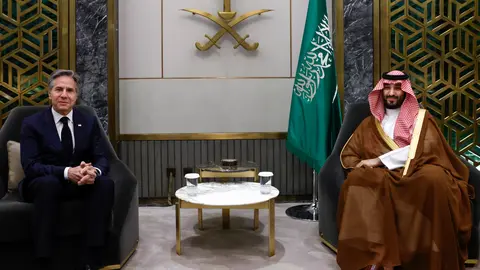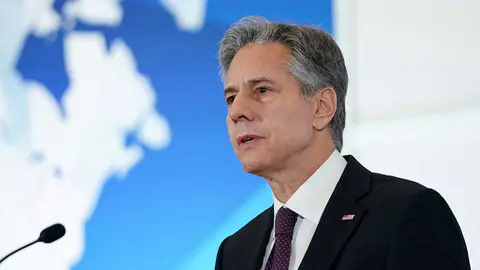Blinken in Israel to press for humanitarian aid and Gaza truce

US Secretary of State Antony Blinken is in Israel on Friday to press for the delivery of humanitarian aid to the Gaza Strip before the UN Security Council votes on a Washington resolution calling for an "immediate ceasefire".
In Qatar, mediators in the conflict are also working to reach a six-week truce agreement between Israel and Hamas, as well as the release of hostages taken by the Palestinian Islamist group and an increase in humanitarian aid to Gaza.
Israel nonetheless maintains its plan to launch a ground assault on the southern Gaza city of Rafah, where 1.5 million people, mostly displaced by the conflict that began on 7 October, are crowded together.
Israeli Prime Minister Benjamin Netanyahu says an offensive on Rafah, located on the border with Egypt, is necessary to end the Islamist movement's "last bastion".
On his sixth tour of the Middle East since the start of the war, Blinken said from Egypt that a major operation against Rafah would be "a mistake" and that "there are better ways to deal with the threat" from Hamas.
Clashes have continued in recent hours, especially at the territory's largest hospital, Al Shifa Hospital in Gaza City.
Israeli forces there claim to have killed more than 140 Palestinian fighters and arrested more than 350 since the beginning of the week.
Truce "still possible"
Blinken, who will meet Netanyahu on Friday, also noted that "the gaps are narrowing" in negotiations for a truce. "It is difficult to achieve, but I think it is still possible," he said.
In parallel to these talks, the US submitted a draft resolution to the UN Security Council calling for a ceasefire "linked to the release of all remaining hostages".
The latest version of the text, consulted by AFP, stresses the need for "an immediate and durable ceasefire to protect civilians on all sides and allow for the delivery of humanitarian aid".
Israel's historic ally, the United States has so far vetoed several UN resolutions calling for a ceasefire, believing that this would have benefited the Islamist Hamas movement.
But with the human cost of the war and the threat of famine in Gaza, Washington is increasing pressure on Israel to reach a truce and avoid a ground offensive on Rafah.
Prime Minister Benjamin Netanyahu is currently meeting privately, at the Kirya in Tel Aviv, with US Secretary of State Antony Blinken. An expanded meeting with the members of the War Cabinet will be held later. pic.twitter.com/G6cPPBQpBc
— Prime Minister of Israel (@IsraeliPM) March 22, 2024
European Union countries also urged Israel to refrain from storming Rafah and called for an "immediate humanitarian pause" in the conflict.
They were joined on Friday by US and Israeli allies Australia and the UK, which in a statement declared "the urgency of an immediate cessation of fighting in Gaza".
China said it "supports" the Security Council taking "meaningful action" to "bring an early end to the fighting in Gaza". Beijing, a permanent member of the Council, did not say whether it would support Washington's text.
The war erupted on 7 October with Hamas's surprise assault on southern Israel, killing some 1,160 people, mostly civilians, according to an AFP count based on official Israeli data.
Some 250 people were also kidnapped in southern Israel. Of these, some 130 remain in Gaza, of whom 33 are reportedly dead, according to Israeli estimates.
In response to the attack, Israel vowed to "destroy" Hamas and launched an air and ground operation against the Gaza Strip, controlled by the Islamist movement since 2007.
So far, 31,988 people have been killed in Gaza as a result of this operation, mostly civilians, according to the territory's health ministry.
We've been working for an immediate ceasefire that secures the release of hostages.
— Secretary Antony Blinken (@SecBlinken) March 21, 2024
This would create space to surge more humanitarian aid in Gaza, relieve the suffering of many people, and build the foundation for an enduring peace. pic.twitter.com/cAIojga9FG
Threat of famine
On the sidelines of Blinken's trip to Israel, Israeli intelligence chief David Barnea is scheduled to meet in Doha with his US and Egyptian counterparts, William Burns and Abbas Kamel, and Qatari Prime Minister Mohammed bin Abdulrahman Al Thani.
Hamas last week agreed to a six-week truce rather than a permanent ceasefire as previously demanded. But differences remain over the exchange of Hamas hostages for Palestinian prisoners in Israeli jails.
A truce agreement should also lead to an increase in humanitarian aid to the Gaza Strip, where NGOs and UN agencies warn of the imminent risk of famine.
Israel currently imposes a near-total siege on the enclave and closely monitors all incoming aid, slowing the flow, mainly from Egypt.
"Children are starving. They are deprived of food," warned the UN Committee on the Rights of the Child, reiterating its call for a ceasefire.
Several countries are organising food airdrops and a sea corridor has also been opened from Cyprus to Gaza, but the UN reiterates that these initiatives are not a substitute for ground deliveries.










